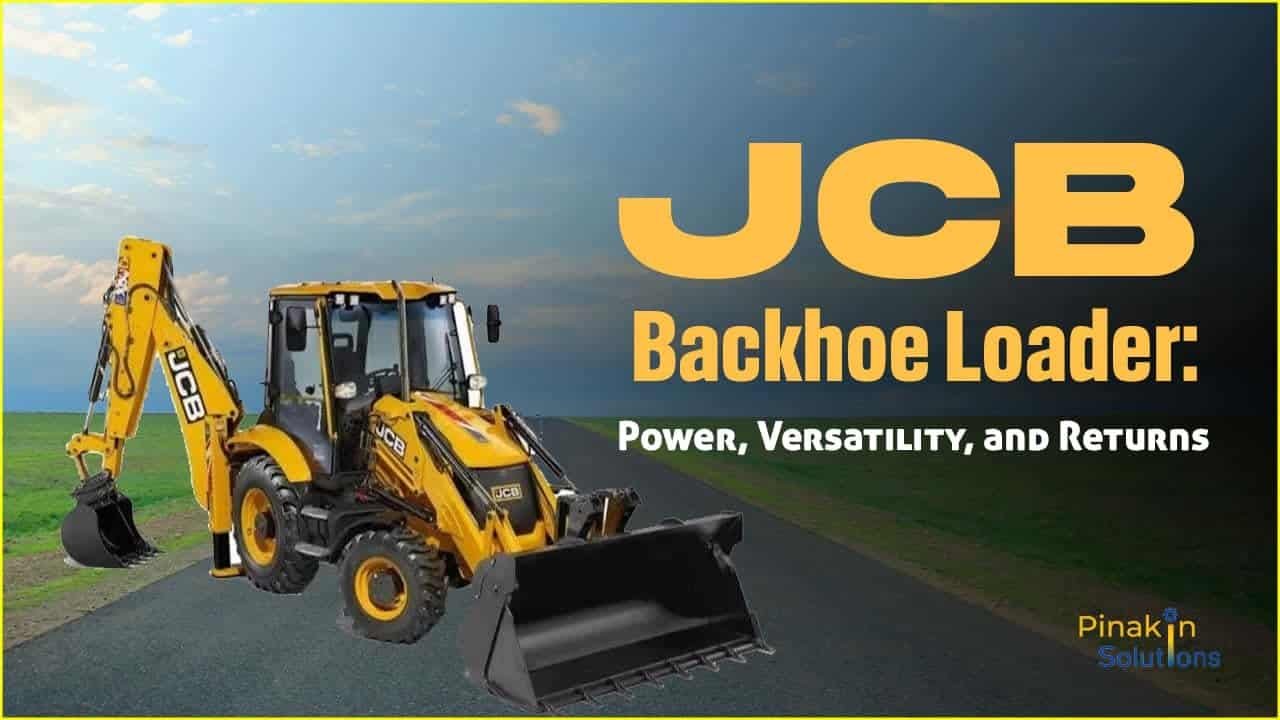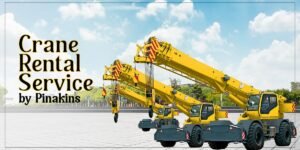In the world of heavy machinery, one name stands tall as a beacon of reliability, innovation, and versatility – JCB. Among their impressive lineup of construction equipment, the JCB Backhoe Loader has emerged as a true icon in the world of excavation and earthmoving.
In this article, we will delve deeper into the realm of JCB Backhoe Loaders, exploring their specifications, the return on investment (ROI) of renting these mighty machines, and the myriad benefits they bring to the construction industry.
Table of Contents
ToggleBackhoe Loader: A Glimpse into Excellence
Unmatched Versatility:
JCB Backhoe Loaders are celebrated for their multifaceted capabilities. They combine the functionality of a front loader and a rear excavator into a single, compact machine, making them an ideal choice for a wide range of applications. Whether you’re digging trenches, loading materials, or performing other excavation tasks, a JCB Backhoe Loader can seamlessly transition between these tasks, saving both time and resources.
Robust Construction:
These machines are built to withstand the toughest of job sites. Featuring a robust chassis and heavy-duty components, JCB Backhoe Loaders are engineered for durability. They are well-equipped to handle the rigors of construction, ensuring longevity and reduced downtime.
Exceptional Reach and Digging Depth:
The JCB Backhoe Loaders come in various models, each with distinct specifications. When it comes to reach and digging depth, these machines excel. They can dig deep trenches and extend their arms to reach difficult spots, providing unparalleled versatility on the job site.
JCB Backhoe Loader Models: A Comparison
Let’s take a closer look at some of the popular JCB Backhoe Loader models and their specifications in the following table:
| Model | Engine Power | Maximum Digging Depth | Maximum Loader Capacity | Weight |
| JCB 3CX | 92 hp | 14.3 feet | 1.25 cubic yards | 18,000 lbs |
| JCB 4CX | 109 hp | 14.8 feet | 1.3 cubic yards | 20,000 lbs |
| JCB 3CX Compact | 74 hp | 13.8 feet | 1.0 cubic yards | 15,000 lbs |
| JCB 1CXT | 49 hp | 10.3 feet | 0.28 cubic yards | 8,000 lbs |
ROI of Renting JCB Backhoe Loaders
When considering the acquisition of construction equipment, rental often emerges as an attractive option due to several compelling reasons
Cost-Efficiency:
Renting a JCB Backhoe Loader eliminates the upfront purchase cost, allowing businesses to allocate their capital more strategically. It also eliminates the need for maintenance and repair expenses.
Flexibility:
Different projects have different equipment requirements. Renting enables businesses to access the right JCB Backhoe Loader model for a specific project without the commitment of long-term ownership.
No Depreciation Concerns:
Heavy machinery tends to depreciate over time. By renting, businesses avoid the depreciation hit, ensuring a more stable financial position.
Access to the Latest Technology:
The construction industry continually evolves with new technological advancements. Renting JCB Backhoe Loaders allows businesses to use the latest models with cutting-edge features and improvements.
Read More :
- Bored Piling Machines: Unveiling Engineering’s Deep Foundation Innovators
- Vibro Hammer Machine: Revolutionizing Foundation Construction
- Maintenance Tips for Boom Placers : Maximizing Performance and Extending Lifespan
Eco-Friendly Operation with JCB Backhoe Loaders:
In an era where environmental consciousness is paramount, JCB Backhoe Loaders have made significant strides towards eco-friendliness. Many models are equipped with engines that meet stringent emission standards, reducing their carbon footprint.
Additionally, JCB has focused on noise reduction technologies, making these machines more environmentally friendly and conducive to work in urban and noise-sensitive areas. This eco-conscious approach not only aligns with sustainability goals but also ensures compliance with increasingly stringent regulations.
ROI of Renting Vs Purchase of jcb backhoe loader
The decision between renting and purchasing a JCB Backhoe Loader is a crucial one for construction businesses, as it directly impacts their financial bottom line. Let’s conduct a comprehensive Return on Investment (ROI) analysis to compare the two approaches and help businesses make an informed choice.
Renting a JCB Backhoe Loader : Advantages
Immediate Cost Savings: When you choose to rent a JCB Backhoe Loader, you avoid the substantial upfront purchase cost, which can be a significant financial burden for many businesses. This frees up capital that can be used for other essential operational expenses or investments.
No Maintenance Costs: Maintenance and repair costs are typically the responsibility of the rental company. This eliminates unexpected expenses associated with owning a machine, contributing to cost predictability.
Flexibility: Renting offers the flexibility to choose the right JCB Backhoe Loader model for each project. You can select the equipment that perfectly matches the specific requirements of the job, ensuring optimal efficiency.
No Depreciation Worries: Heavy machinery like backhoe loaders tends to depreciate over time. By renting, you avoid the depreciation hit and can better manage your budget without the worry of diminishing asset value.
Must Read These Also.
- Vibratory Hammer on Rent: Enhancing Construction Efficiency and Flexibility
- Boom Placers: Enhancing Efficiency and Precision in Construction Projects
Considerations:
Rental Costs: While renting offers immediate cost savings, businesses should evaluate the long-term rental costs. Depending on the frequency and duration of equipment use, these costs can accumulate over time and may eventually exceed the cost of purchasing a machine.
Availability: Rental availability depends on factors like location and demand. There may be instances where the specific JCB Backhoe Loader model you need is not readily available for rent, potentially causing project delays.
Purchasing a JCB Backhoe Loader: Advantages:
Ownership: When you purchase a JCB Backhoe Loader, you acquire a valuable asset that can appreciate in value over time. This can serve as a long-term investment and contribute to your company’s equity.
No Rental Costs: Unlike renting, there are no ongoing rental expenses. Once you’ve paid for the equipment, it becomes a fixed asset, and the cost remains static over time, except for maintenance and operational expenses.
Customization: Ownership allows you to customize the machine to your specific needs, potentially enhancing its versatility and performance for your projects.
Considerations:
Upfront Costs: The initial purchase cost of a JCB Backhoe Loader can be substantial, and it might strain your company’s financial resources.
Maintenance and Repairs: As the owner, you’re responsible for all maintenance and repair expenses. These costs can fluctuate and be unpredictable, potentially affecting your overall ROI.
Depreciation: While owning a backhoe loader can be an asset, it’s essential to recognize that heavy machinery depreciates over time. This depreciation can affect the asset’s book value and impact your financial statements.
Determining Your ROI
To determine whether renting or purchasing a JCB Backhoe Loader is the better choice for your business, you should conduct a detailed financial analysis.
Calculate the expected costs of renting over the duration of your projects and compare that to the cost of purchasing, factoring in maintenance, depreciation, and financing if applicable. Consider your specific project needs, budget constraints, and long-term business goals.
In conclusion,
The JCB Backhoe Loader is more than just a piece of heavy machinery; it’s a multifaceted solution that combines power, versatility, technology, and environmental responsibility.
With a range of models, global support, and customization options, JCB Backhoe Loaders are poised to continue revolutionizing the construction industry while ensuring a strong return on investment for businesses large and small. By embracing these machines, construction professionals can not only enhance their operational efficiency but also contribute to a sustainable and eco-conscious future.





